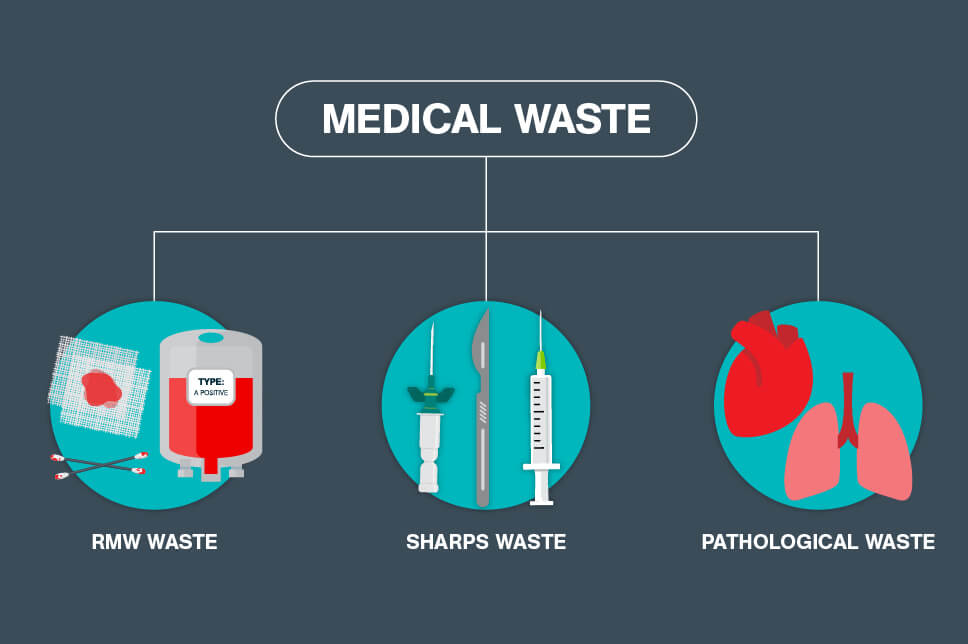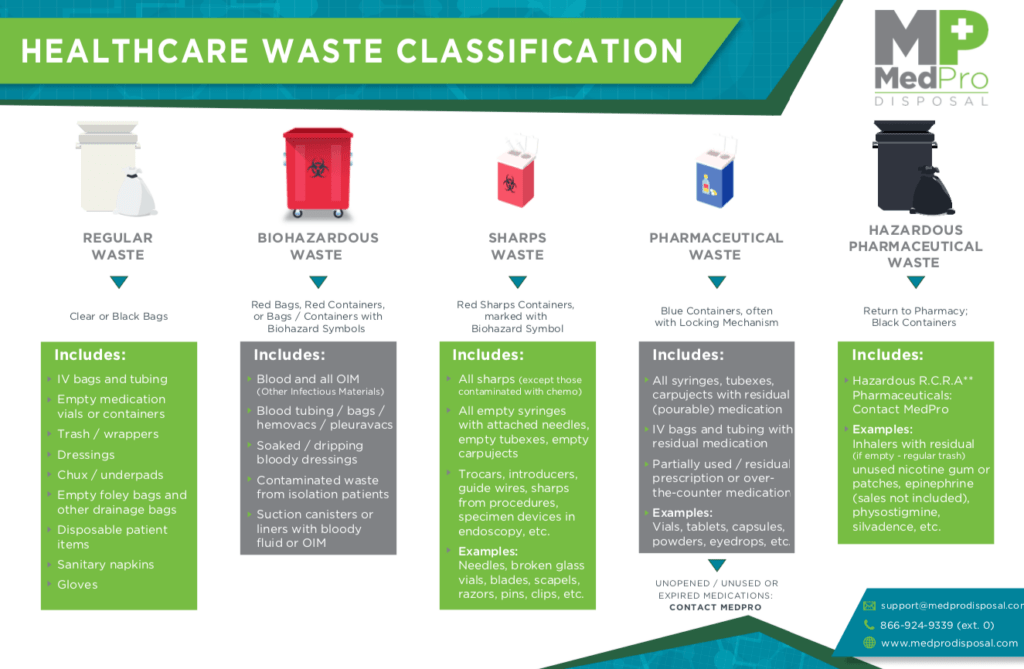Making Certain Safe Handling and Disposal of Medical Waste
Making sure risk-free handling and disposal of medical waste is of paramount importance in medical care setups. Incorrect administration of medical waste can posture significant risks to the setting, public wellness, and health care workers. In this introduction, we will discover the value of appropriate medical waste administration, the threats connected with improper handling and disposal, as well as the standards and methods that can be implemented to guarantee its risk-free disposal.
Importance of Correct Clinical Waste Administration
Proper clinical waste management is of utmost relevance in making certain the safety and security and wellness of healthcare experts, patients, and the public. Medical waste refers to any waste created by healthcare facilities during the medical diagnosis, therapy, or immunization of human beings or pets. This waste can present serious health and wellness threats otherwise managed and disposed of effectively.
One of the main reasons that proper clinical waste monitoring is critical is to avoid the spread of contagious conditions. Clinical waste, such as made use of needles, contaminated dressings, and organic products, can lug harmful microorganisms. Otherwise dealt with and disposed of correctly, these microorganisms can be sent to healthcare workers, individuals, waste trainers, and even the public, leading to the prospective break out of diseases.
Additionally, appropriate clinical waste monitoring assists safeguard the atmosphere - medical waste disposal service. Clinical waste has hazardous products, including chemicals, pharmaceuticals, and radioactive compounds. When not handled appropriately, these substances can contaminate soil, water bodies, and the air, positioning a substantial risk to environments and public wellness
In addition, reliable clinical waste monitoring makes certain conformity with neighborhood laws and global requirements. Federal governments and governing bodies have actually developed methods and standards to make certain the secure handling, storage space, transportation, and disposal of clinical waste. Following these policies is vital to prevent legal effects and keep the online reputation and reliability of healthcare centers.
Threats of Improper Handling and Disposal

People can also be subjected to these contagious conditions if clinical waste is not correctly taken care of. If infected needles or other sharps are not disposed of in designated puncture-proof containers, they might inadvertently prick patients, leading to prospective infections. Moreover, if medical waste is not segregated correctly, there is a risk of cross-contamination between various kinds of waste, more boosting the possibilities of illness transmission.
Inappropriate disposal of medical waste can also have detrimental results on the atmosphere and the general public. If medical waste is not dealt with and taken care of appropriately, it can pollute water sources, dirt, and air, causing the spread of illness and pollutants. This can have lasting repercussions on communities and public health.
Standards for Safe Handling of Medical Waste
Executing effective procedures for the safe handling of clinical waste is vital in ensuring the defense of health care specialists, individuals, and the general public. These standards are vital in minimizing the threats connected with the handling and disposal of clinical waste, such as infections, injuries, and environmental air pollution.
Primarily, medical care facilities need to establish a detailed waste management plan that complies with local, national, and global policies. This strategy needs to include clear guidelines on waste segregation, packaging, transportation, storage, and labeling. It is crucial to separate various sorts of waste, such as sharps, transmittable products, drugs, and non-hazardous waste, to stop cross-contamination and advertise safe disposal.
Additionally, health care employees must get thorough training on appropriate waste handling methods. They need to be enlightened on the potential risks of medical waste, the proper use individual protective equipment (PPE), and the appropriate treatments for handling, carrying, and dealing with various sorts of waste.
In addition, healthcare facilities must regularly monitor and audit their waste monitoring practices to ensure conformity with standards. This consists of carrying out routine examinations, assessing waste handling treatments, and supplying comments and training to personnel.
Efficient Techniques for Waste Disposal
To guarantee the safe handling and disposal of clinical waste, it is vital to use efficient techniques for waste disposal. Clinical waste can posture considerable dangers to public health and the environment otherwise managed and gotten rid of correctly. Healthcare centers and waste administration companies need to execute appropriate approaches to alleviate these threats.
It entails separating various types of clinical waste based on their characteristics. Health care facilities ought to give clear guidelines and training to team members on exactly how to set apart waste properly.

Moreover, medical care facilities should work together with accredited waste monitoring firms to ensure proper disposal of medical waste. These business have the know-how and tools called for to securely handle and dispose of medical waste in compliance with guidelines and finest techniques.
Training and Education And Learning for Healthcare Professionals
Medical care experts play a crucial role in guaranteeing the secure handling and disposal of clinical waste with thorough training and education and learning. It is essential for doctor to have a deep understanding of the potential risks connected with clinical waste and the appropriate procedures for its management. By receiving correct training, medical care specialists can decrease the possible transmission of contagious diseases, prevent environmental contamination, and protect both themselves and the general public.

Moreover, training programs should highlight using individual safety devices (PPE) and proper hand hygiene techniques when taking care of medical waste. medical waste disposal service. Medical care specialists should know how to correctly make use of and get rid of of PPE to secure themselves from prospective exposure to unsafe materials. They need to likewise be educated on the value of regular handwashing and the proper use hand sanitizers to reduce the spread of infectious conditions
Proceeding education and normal updates on medical waste administration techniques are vital for healthcare specialists. As laws and guidelines develop, it is vital to maintain medical care providers educated concerning any type of changes in protocols and finest practices. This will certainly make certain that they stay current and preserve a high criterion of security in disposing and dealing with of clinical waste.
Verdict
In final thought, correct handling and disposal of clinical waste is vital to make sure the security of health care experts, people, and the environment. By sticking to these practices, we can reduce the prospective dangers linked with medical waste.
Clinical waste refers to any waste produced by health care facilities during the medical diagnosis, therapy, or immunization of animals or human beings. If medical waste is not set visit their website apart effectively, there is a risk of cross-contamination between various types of waste, additional increasing the possibilities of disease transmission.
It is important to separate different types of waste, such as sharps, infectious materials, drugs, and non-hazardous waste, to protect against cross-contamination and advertise secure disposal. WasteX Medical Waste Disposal.
To make certain the risk-free handling and disposal of medical waste, it is necessary to employ effective techniques for waste disposal. Furthermore, healthcare centers need to establish a routine waste collection and transport timetable to prevent waste buildup and minimize the danger of mishaps or contamination.